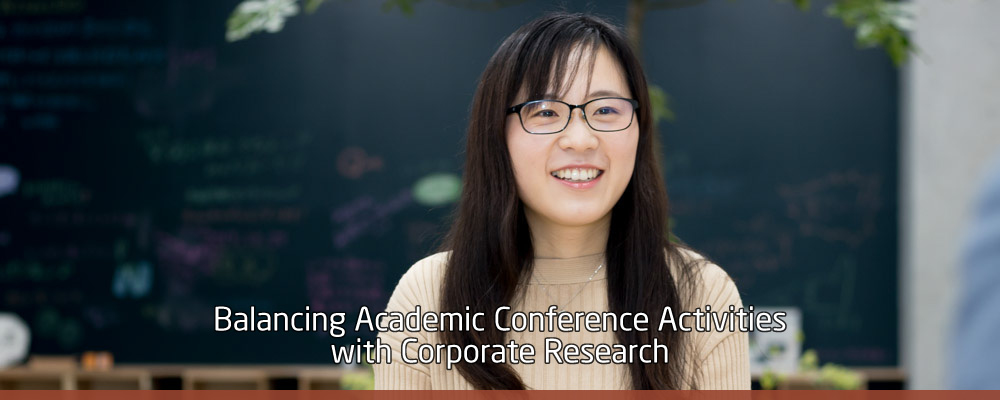Global Site
Breadcrumb navigation
Message for students 2018: Tingting Dong
May 30, 2018
Tingting Dong

Tingting Dong
Researcher, Biometrics Research Laboratories
Tingting has been engaging in research on database from her student days before joining NEC in 2016. She now continues to regularly present research papers and speak at international academic conferences while doing research on multimedia databases. She is also a member of the NEC Mountaineering Club and actively enjoys her hobby of mountain climbing.
NEC's multimedia database research continues to lead the world
Our team is working on multimedia databases which integrate video search technology with database technology. Database for searching multimedia content is a new research topic pioneered by NEC. We utilize NEC's famous image recognition technologies like face recognition and machine learning technologies, and have developed the world's first technology which can quickly search for information from videos, images, and other media. "Profiling Across Spatio-Temporal Data" is one technology which has resulted from our team's work.
This technology enables quick search of objects that appears in a specific pattern from a large volume of video images. For example, if you are searching video footage for someone who committed a crime, typically you cannot detect them unless you know what the criminal's face looks like. However, by using this technology, you can analyze a person's behavioral patterns from a large volume of data, and detect someone who behaves in a suspicious manner which deviates from the normal patterns of behavior. In practice, this technology has been successfully used to detect "Dashiko", a person making repeated unauthorized withdrawals from ATMs, in demonstration experiments jointly conducted with a financial institution in 2016.
Recently, I have extended this technology to allow for video search using not only face information, which has already been established by my senior colleagues, but also multiple features including clothing color, gender, and age. Application scenarios of this extended technology are not limited to criminal investigations. For example, by searching "female" and "20s" over videos collected from security cameras installed in shopping malls, we can know the type of fashions that are now popular with young women. This technology can be applied to such kind of marketing activities. This search technology was just announced at the recent exhibition, so we are now working on productization.
An environment where researchers can continue to actively attend international academic conferences and present research papers

When entering a PhD program, I planned to do research in the academic world even after graduation. However, from that time I found that many NEC researchers were also active at international academic conferences. In fact, my current senior colleague Jianquan, is well-recognized at an academic conference that I attended continually, and we first met at that conference. He has been very active at academic conferences, discussing with various researchers and students, expanding research areas and network of connections, and conducting collaborative research. I learned from his example and have been proactively communicating with various researchers and students at academic conferences. As a result, at a recent academic conference a professor from an Irish university expressed an interest in my research and suggested collaborative research with our team.
In October 2016, I also had the fortunate opportunity of giving a talk at Stanford University. It was the first time for me to give a talk by myself, so I was very nervous (laughs). After introducing the research works of our team, I received comments like the works are very practical and interesting.
In this way, I am actually continuing to conduct research the same as in my academic PhD period, attending academic conferences and presenting research papers. I think that this is one advantage of conducting research at NEC. To be honest, I was anxious about conducting research at a company before joining NEC. But when actually joined the company, I was patiently supported by my senior colleagues when things were unfamiliar, and I am also able to attend academic conferences just like before. In addition, during my academic days, research works were completed once presented as papers. However, in corporate research, technologies become products and businesses after the research papers are presented, and you get to experience the joy of seeing them being put to use by users. Certainly, there are concerns about costs and business, but even so I feel that I am now able to engage in a more fulfilling type of research than in my academic days. When research works are completed, it is also very satisfying to see it posted on the website and broadly reported in the media (laughs).
Surrounded by diverse talent and aiming to be a world-class researcher

I think that NEC's laboratories are a really great environment for researchers. First, the fact that the company's scale is large and there are researchers in various fields is actually quite valuable. Because there are so many researchers and many of them may be working on research topics that are close to yours, there are many people you can talk with. On the other hand, if you need a technology from a field that you do not know very well, you can easily collaborate with a researcher in that field inside the same company. I don't think that my research on video search technologies would have succeeded without the cooperation of NEC researchers who worked on face recognition and AI technologies. I am very lucky to be in an environment where I can immediately collaborate with the top people in any research field.
The laboratories are becoming more global, and in addition to Chinese people like myself, there are researchers from many countries such as India, Brazil, Thailand, and Germany. Japanese is the main language of conversation within the company, but most of the researchers can speak English, so we communicate using English as well. There are many researchers who are active at international academic conferences, so it is also appealing that the environment is not bound by Japan. I hope to produce more and more results as a multimedia database researcher and remain active in this field with the goal of becoming a researcher who is known not only within NEC or Japan but around the world.
